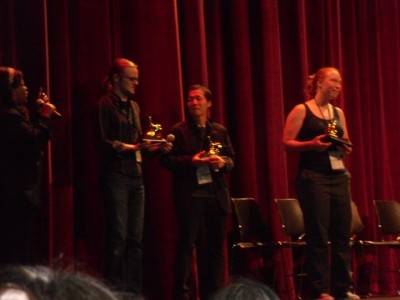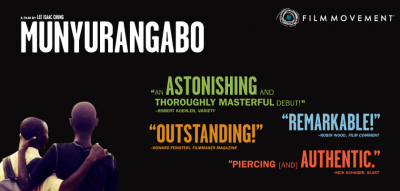
The two words I kept reading about this movie, before I saw it at the Virginia for Ebertfest, were “uplifting” and “Rwanda.”
Odd, no? I didn’t see how that was quite possible. Poignant, yes. Hopeful, yes, but not particularly uplifting.
I have to say, though, that I believe I stand corrected.
Munyurangaba is a story of two boys, Sangwa and Ngabo (get it? Munyurangabo), who are going on a journey.
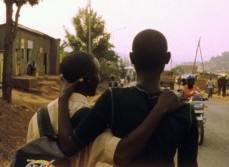 The film begins with two boys talking with each other about things that they do not explain to the audience. It is somewhat refreshing, as it seems that the director trusts the audience enough to figure out that we’ll be clued in on everything later in the movie. The two boys, on their journey, travel to Sangwa’s home, where he hasn’t been in three years, and while Ngabo keeps wanting to leave, Sangwa keeps wanting to stay.
The film begins with two boys talking with each other about things that they do not explain to the audience. It is somewhat refreshing, as it seems that the director trusts the audience enough to figure out that we’ll be clued in on everything later in the movie. The two boys, on their journey, travel to Sangwa’s home, where he hasn’t been in three years, and while Ngabo keeps wanting to leave, Sangwa keeps wanting to stay.
The rising tension between Ngabo vs. Sangwa and Sangwa’s family is a stark contrast from the two boys at the beginning of the movie: non-stop touching and smiling at each other, more brothers than friends.
In the background of this small family drama is the growing realization that Ngabo is completely alone, due to his parents being killed in the genocide. A genocide, by the way, perpetrated against his people by Sangwa’s people. Not individually, to the best of anyone’s knowledge, but in a larger picture scale, they are on “different sides” while in the same country. They have never hurt each other, personally, and all of this happened while they were young boys, but the legacy and shadow lives on, exacerbated by the tensions of Sangwa’s parents judging Ngabo, saying, “Hutus and Tutsis are supposed to be enemies.”
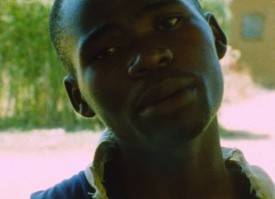 This movie has two climaxes. The first, I will not ruin, as Ngabo finally reaches the end of his journey, and the audience is viewing everything, at this point, through his eyes. The other is a poem by Edouard B Uwayo, as he recites, “Liberation is a Journey,” which I will admit, moved me to tears.
This movie has two climaxes. The first, I will not ruin, as Ngabo finally reaches the end of his journey, and the audience is viewing everything, at this point, through his eyes. The other is a poem by Edouard B Uwayo, as he recites, “Liberation is a Journey,” which I will admit, moved me to tears.
Watching the film was fantastic, as all these films usually are, in that whether you hate them or love them, you tend to watch films at this fest that you wouldn’t ordinarily go see. However, what adds to the experience are the speeches and comments by the guests at the end of the film.
I’m not a newbie to Ebertfest, but I’m not an expert either. I went to Perfume, back in 2007, and got to see a teeny tiny Alan Rickman on stage from my terribly bad seats in the balcony, rolling his eyes at the lady asking him which potion his character in this film might have made, as compared to Snape (really?).
I’m happy to report that this lady was not in existence at Munyurangabo. Rather, when the lights came on after a pretty fantastic film, there was a great explication of the movie by the director, Lee Isaac Chung. He, along with the other two guests involved with the movie, Jenny Lund and Samuel Anderson, then took questions from the audience. All of their comments were extremely enlightening.
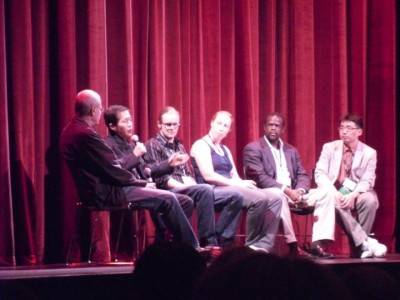
One highlight from the Q/A was the admission that much of the dialogue — as I had guessed by how stilted it sounded to me in the way that things alien to my culture tend to be — was improvised by the actors. The director and producers would explain to the actors what they were going for, then the actors would construct lines in ways that sounded most natural for them.
This type of caring about authenticity towards the “natural” tone of the movie is what sets this movie apart from other movies made by Western directors of a culture not their own. A comment from the stage was that it was different from, say, “Blood Diamond,” in that theirs was a movie made to be watched and understood by Rwandans, rather than to be viewed as an “exotic” film by Americans. All cinema out of Africa seemed to be coming from a Western perspective, in his opinion, and he wanted something that worked with a Rwandan audience.

Chung’s wife, before they got married, would volunteer in Rwanda. Apparently after they got married, she wanted to go back, and told her husband, “You’ll figure out something to do.” His idea was to teach film while he was there, and he decided that the best way to teach was to make a film and treat it as seriously as possible. He brought his friends from school, Jenny Lund and Samuel Anderson, who worked as Sound Engineer and Screen Writer, respectively, as well as co-producers. Chung expressed his amazement at getting to make a film that they all believed in.
One of the most interesting things about this movie, besides their commitment to authenticity, was how flexible they were in making the story. Apparently they came in with a screenplay, then altered backstories and details in ways that would work best with the actors and their backgrounds, which led to extraordinary performances. The thing that is even more awe-inspiring is that this movie was made in only 11 days of filming. When the director offhandedly mentioned this, the audience spontaneously burst into applause. That such a sincere and heartfelt work was done in a matter of 11 days seems nothing short of miraculous.
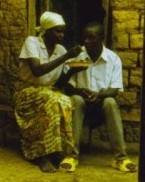 Sangwa was played by Eric Ndorunkundiye, a runaway who had not seen his family for three years. People watching the movie should note that this is Sangwa’s backstory as well. In the scene where Sangwa returns home and is greeted by his mother and belittled by his father, the director conceded that he mainly let Eric direct the scene, describing it exactly as it was when he returned to his own family only a few months earlier.
Sangwa was played by Eric Ndorunkundiye, a runaway who had not seen his family for three years. People watching the movie should note that this is Sangwa’s backstory as well. In the scene where Sangwa returns home and is greeted by his mother and belittled by his father, the director conceded that he mainly let Eric direct the scene, describing it exactly as it was when he returned to his own family only a few months earlier.
Another example is that Jeff Rutagengwa, the actor who portrays Munyurangabo, was also an orphan of the genocide, until discovering — many years later in his life — that his father had actually survived. This type of truth in acting led to a very sincere performance by all involved.
Not to be missed is the performance by Edouard B Uwayo, who performed a poem which he also recited as poet laureate for Rwanda’s Liberation Day official ceremony. Apparently, the original assignment was for Edouard to perform the poem during a film class that Chung was teaching. However, his performance was so moving in the class for both the director, as well as the other students, that he was written into the movie, and it truly is an awe-inspiring performance. The only thing that took away from it was the necessity to read the subtitles at the bottom of the screen, thus hindering the experience of watching the poet as he delivered his verses.
As I said, I was very surprised to leave the theatre with an uplifted spirit, full of hope, and all I can say is, “Well done.” The director, when first describing the movie, said that he was trying to deliver with his film, “something of worth.” That has most definitely been accomplished in Munyurangabo.
